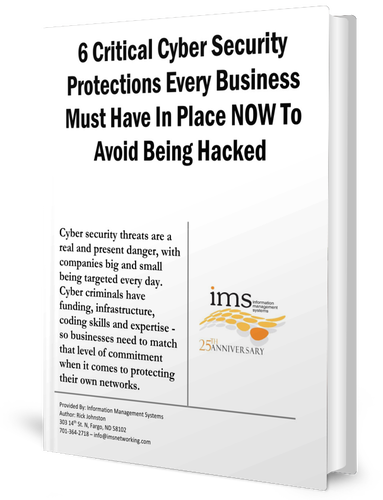
Imagine losing $60 million from a simple email. That’s exactly what happened to a mid-sized company in Europe last December—and it all started with what looked like a normal wire transfer request.
Now, you might be thinking, “That’s not going to happen to my small business.” But here’s the reality: cybercriminals love targeting small businesses during the holidays. You’re busy. Your team is stretched. And most importantly, you may not have the safeguards in place to catch a scam in time.
At Information Management Systems (IMS), we’ve seen how fast and far these threats can go—and we’re here to make sure it doesn’t happen to you.
Real Example: The $3,000 Gift Card Text That Worked
Last December, an accounts payable clerk got a text from her “CEO” asking her to buy $3,000 worth of Apple gift cards for client appreciation. It sounded strange—but it was the holidays. The message had the CEO’s name. Things were hectic.
She bought the cards, scratched off the backs, and emailed the codes.
Only later did she find out: it was a scam. And the money? Gone.
This isn’t rare. In 2023, gift card scams cost U.S. businesses over $217 million. And that’s just one type of attack.
Top 5 Holiday Scams That Could Hit Your Business
1. The “Your Boss Needs Gift Cards” Scam
The play: A text or email appears to come from a manager or owner asking for urgent gift card purchases.
Why it works: It’s fast, casual, and comes during a busy time.
How to prevent it:
- Set a zero gift card policy via text or email.
- Require two-person approval for any gift card purchases.
2. Wire Transfer Fraud / Payment Redirection
The play: Criminals pose as vendors or internal staff, sending fake “updated banking info” right before year-end invoices are paid.
Why it works: The emails look legitimate and come at peak invoice time.
How to prevent it:
- Never trust payment changes via email. Always confirm via a known phone number.
- Use a “call-to-confirm” rule for any transaction over $5,000.
3. Fake Shipping Alerts
The play: Phishing messages pretend to be from FedEx, UPS, or USPS, asking you to “reschedule a delivery.”
Why it works: Your team may be expecting holiday packages.
How to prevent it:
- Train staff to go directly to official carrier websites instead of clicking links.
- Bookmark trusted tracking pages for easy access.
4. Malware in “Holiday Party” Files
The play: A friendly-looking file like “HolidaySchedule.pdf” or “PartyList.xls” installs malware when opened.
Why it works: Employees are excited and less cautious during the holidays.
How to prevent it:
- Block macros in documents.
- Use antivirus tools to scan attachments.
- Encourage your team to verify unexpected files before opening.
5. Fake Holiday Charities & Fundraisers
The play: Criminals mimic legitimate charities or create fake “company match” programs.
Why it works: The holidays are a time for giving.
How to prevent it:
- Share a pre-approved list of trusted charities.
- Require all donations to go through official channels.
Why These Scams Work So Well
These aren’t the old-school “Nigerian prince” emails. Today’s cybercriminals are smart, organized, and do their homework. They know who your vendors are, who your executives are, and how to exploit year-end chaos.
And most small businesses just aren’t prepared:
- 73% of all cyberattacks in 2024 involved business email compromise.
- Only 36% of small businesses run phishing simulations.
- Multifactor authentication (MFA)—which blocks 99% of login attacks—is still not standard for many small firms.
Your Holiday Cybersecurity Checklist
Protect your business with these quick-win policies:
Before the holidays hit:
- Enforce the Two-Person Rule for high-value transactions
- Document a Gift Card Policy—no approvals over text or email
- Verify payment updates by phone using trusted vendor info
- Enable Multifactor Authentication (MFA) on all business accounts
- Educate your team on these scams in a 10-minute holiday huddle
It’s Not Just About Money
Orion S.A. lost $60 million in one holiday-season attack—but for small businesses, even a $10,000 loss can sting.
Other hidden costs include:
- Lost productivity while cleaning up the mess
- Customer trust damaged if data is exposed
- Higher insurance premiums
- Staff morale dropping due to preventable issues
And worst of all: spending your holiday break scrambling to fix what could have been avoided.
Give Your Business Peace of Mind This Holiday Season
At IMS, we’ve helped small businesses across North Dakota and Minnesota avoid scams, secure their systems, and stay focused on what matters most—running their business.
✅ Fast, responsive support
✅ Friendly, knowledgeable team
✅ 20+ years of trusted service
✅ Proactive, not reactive cybersecurity
Let’s make sure your business is protected before year-end.
Schedule a FREE 15-minute Holiday Security Assessment now
Because the best gift you can give your business… is peace of mind.
📞 Call us at (701) 364-2718
🌐 www.imsnetworking.com
FAQ
What are the most common holiday scams targeting small businesses?
The top scams include fake gift card requests, wire transfer fraud, phishing emails from fake shipping companies, malware in holiday-themed attachments, and fraudulent charities.
How can small businesses prevent cyber scams during the holidays?
Set clear internal policies, verify payment changes by phone, train staff to spot phishing, enable multifactor authentication, and review your cybersecurity plan with an IT partner.
Is my business too small to be targeted by cybercriminals?
No. Small businesses are often seen as easy targets because they lack enterprise-level security. In fact, 73% of all cyberattacks in 2024 targeted businesses through email scams.
How much do business email scams cost on average?
According to industry data, the average cost per incident is $129,000—enough to seriously hurt or even shutter a small business.
Can IMS help secure our business before the holidays?
Yes! IMS offers free security assessments and can implement fast, practical protections for your team before peak season hits.



